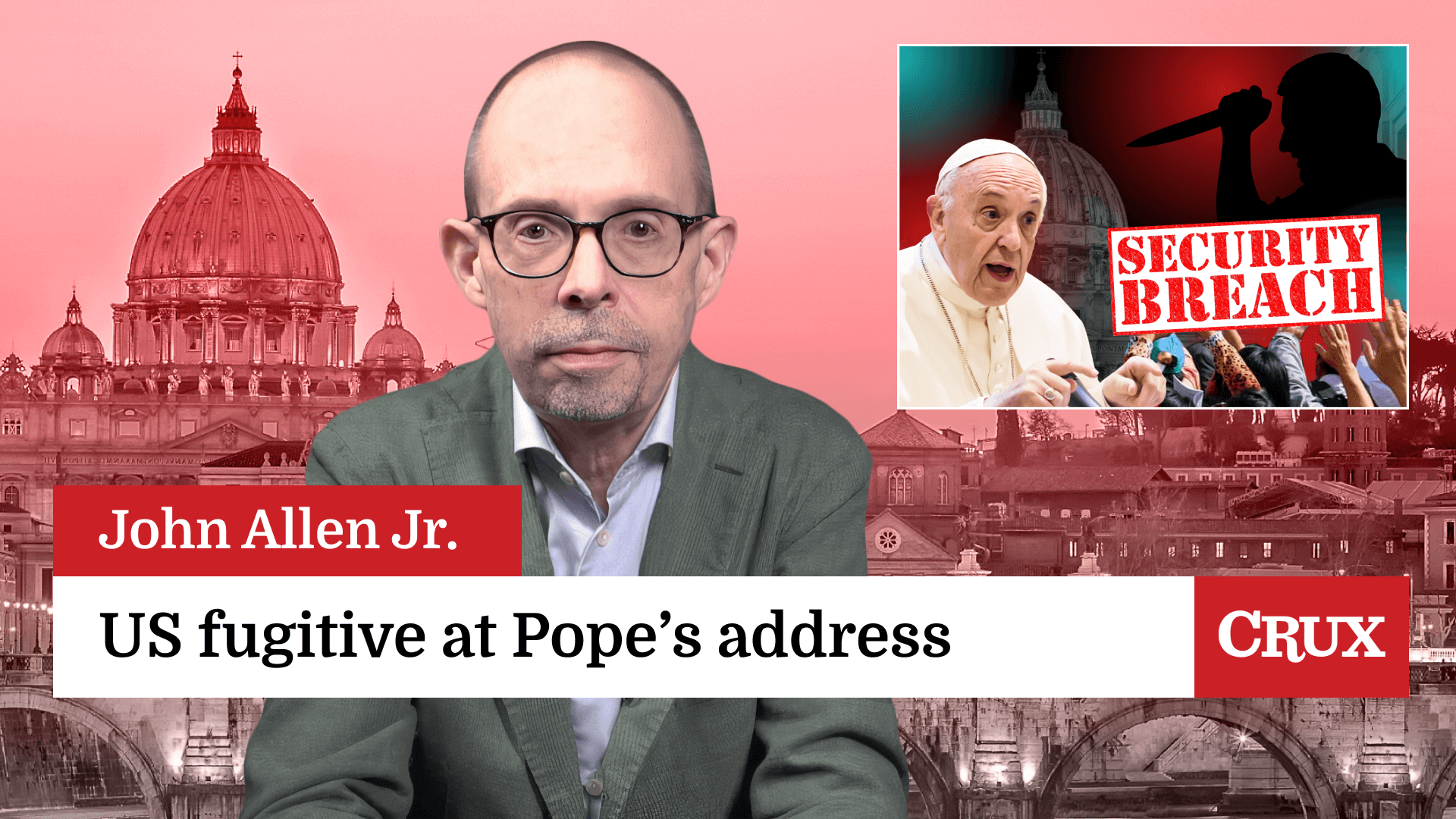As the U.S. bishops’ legislative point man for pro-life issues for nearly four decades, Richard Doerflinger has been armed both with an encyclopedic knowledge of life-related bills in Congress and state legislatures, and a droll sense of humor.
So when asked about the irony of his intention to retire to Washington State – where assisted suicide is now legal – Doerflinger said he will be able to have a firsthand look at the impact of that law, and he added, “I don’t intend to be seeking care from a doctor who would do that.”
The United States Conference of Catholic Bishops recently announced that Doerflinger would be retiring as associate director of its Secretariat of Pro-Life Activities, effective April 29. For the veteran pro-life advocate, his last days in the office proved to be a season for introspection, as well as cleaning up and recycling.
Interviewed by Crux on April 27, Doerflinger sat at his desk, surrounded by neatly stacked mounds of paperwork and bulging boxes on the floor nearby.
He proudly pointed out that he had finally re-organized the books on his book shelf by subject matter related to the life issues, and just that day he had filled a large blue recycling bin with paperwork dealing with defunct legislation and sheets of documentation from bygone meetings of the U.S. bishops.
“Everything old is new again,” said Doerflinger, noting that he had been looking at files related to a 1999 legislative battle over fetal tissue research, which he said is “a live topic again with Planned Parenthood” following the recent controversy over undercover videos that appeared to show some of that organization’s officials casually discussing the sale of aborted fetal remains.
Since joining the conference in 1980 as a pro-life legislative assistant, Doerflinger helped lead the U.S. Church’s response to federal legislation and advised and assisted state legislative efforts, on issues like health care conscience rights, physician-assisted suicide, stem cell research and human cloning.
A member of the Vatican’s Pontifical Academy for Life since 2011, Doerflinger received the University of Notre Dame’s inaugural Evangelium Vitae medal that year. That honor, named for Saint John Paul II’s 1995 encyclical on the “Gospel of Life,” reflects the scope of Doerflinger’s work over the years.
Doerflinger said he is leaving his work “in good hands,” hailing his successor – Greg Schleppenbach, executive director of the Nebraska Catholic Conference – as a skilled pro-life legislative advocate and coalition-builder. For his part, Schleppenbach praised the man he is succeeding as “a pro-life giant.”
A native of Queens, New York, Doerflinger was admittedly green in the area of pro-life advocacy and legislative battles when he came aboard the conference. After earning a master’s degree in religious studies at the University of Chicago and working toward a doctorate in systematic theology at The Catholic University of America, Doerflinger had an academic background in theology and philosophy.
What he calls “on the job training” helped steel him for the pro-life legislative skirmishes in Congress and statehouses that he would face in the years ahead, but he found his work all flowed naturally from his theological background.
“I long felt the Church’s teachings on life issues were compelling,” he said. “I found I was applying what I learned on an abstract level to some very serious and worthwhile issues. It was exciting. I called it practical theology.”
Through the years, Doerflinger and other pro-life advocates have experienced a range of highs and lows, sometimes with the same legislation. He said a high point came in 2010 when the House of Representatives passed an amendment to the Affordable Care Act to prevent federal funding of abortions in health plans, which Doerflinger said solved a problem with the measure related to conscience rights, but he added with a mournful laugh, “one of the low points was watching the Senate strip all that out.”
Other legislative wins that he highlighted included the Partial-Birth Abortion Ban Act signed into law in 2003, and the passage of an amendment in an appropriations bill that prevented federal funding of harmful experiments on human cloning.
On the down side, he noted that legislative disappointments included that “we never got a ban on human cloning, and that will haunt us, as scientists will keep thinking of new ways to manipulate life.” He also regrets that federal laws were not passed banning the use of prescription drugs for assisted suicide.
Through the legislative roller coaster ride over the years, Doerflinger credits his wife of 38 years, Lee Ann, for keeping him grounded and having the right perspective on things. They met as students at the University of Chicago and got married in the Catholic Student Center there.
Lee Ann Doerflinger has served as a Natural Family Planning instructor for the Archdiocese of Washington. Over the years, they gave NFP witness talks for couples preparing for marriage, and Doerflinger said that advocacy aligned with his pro-life work.
“The way we respect the power to create new life does have links to how we view life itself,” he said. “It does create an attitude of reverence for the power to co-create a new life with God.”
Along the way, they raised four children, and Doerflinger said their family adventures included driving “across the country twice, dragging our kids with us.”
Their oldest daughter, Anna Bevill, works as a budget analyst for a Maryland school district and is mother to the Doerflingers’ six-year-old granddaughter Leah. The Doerflingers’ youngest daughter, Maria, works as a public defender in Maryland, and their youngest son Matthew works as a Lyft driver and is studying martial arts.
Their oldest son, Thomas Doerflinger, was serving in the Army in Iraq in 2004 when he was shot and killed at the age of 20. The mourners joining family members and friends at his viewing included some prominent members of Congress and other advocates in the pro-life community.
Doerflinger noted how on the morning of Thomas’s Funeral Mass at St. John the Baptist Church in Silver Spring, Maryland, a general presented them with posthumous Purple Heart and Bronze Star medals, and a Good Conduct Medal for their son who had been a mischievous boy at home. Doerflinger said his son had joined the military after the 9/11 terrorist attacks on the United States, out of a desire to serve his country.
“He felt defending people’s lives was worth doing, at the risk of his own. It was very much a pro-life attitude he took into it,” Doerflinger said.
Now in his retirement, Doerflinger will be moving to Washington State from Washington, D.C., to the state where Lee Ann grew up and still has family. In addition to locating a pro-life family doctor there, Doerflinger – who is 63 – said he will continue his pro-life advocacy.
“I’ll do some of the same things, but more slowly. There are a number of issues in the field I’d like to do more writing and speaking about, but never had the time to do because of day to day crises, and following bills,” he said. He’s looking forward to freelance writing and consulting. “I’ll still be engaged in these issues.”
Some rhythms of his own life will remain, like listening to classical and jazz music, watching an eclectic range of movies, reading books about how many of the world’s greatest scientists were men of faith, and walking the family dog, a golden retriever named Kolbe, named after St. Maximilian Kolbe.
“It’s a Catholic family. Our dog should be named after a saint,” he said, explaining his rationale for Kolbe’s name. “It’s always good to have a (patron) saint who fought the Nazis.”
Doerflinger sees many signs of hope for the pro-life movement, including the personal witness of Pope Francis. “He’s doing something very important, getting back to the core message of God’s love and mercy. It’s in that context all these issues have to be placed,” he said.
The pro-life advocate also is inspired by “the crowds of young people we see every year at the Vigil Mass and March for Life. We have very enthusiastic young Catholics who understand these issues and are ready to take the lead on them.”
Doerflinger expressed relief that recent assisted suicide measures supported by his longtime foe, Compassion & Choices – a group that used to be known as the Hemlock Society – have been defeated in about two dozen states. He advises that pro-life advocates approach these proposals “in very human terms.”
“Talk about the pressures on real people to feel they are a burden and take this option… We have to explain to people why this is not about freedom, it’s about vulnerable people who can be edged toward this by others,” he said.
He also worries about the steady erosion of conscience rights, which can be seen in the current case before the Supreme Court in which the Little Sisters of the Poor and other Catholic institutions are challenging the Department of Health and Human Services’ contraceptive mandate.
“We have to remind people of the positive role of religion and religious institutions in American life. We are major contributors to the common good,” he said.
For Doerflinger, standing up for life has never just been about legislation. When asked for advice for pro-life advocates on fighting the good fight, he said, “Keep talking about these issues, but keep living them. We teach more by example.”
“The Church has been at the forefront of taking care of women in crisis pregnancies and (those who are) grieving from abortions,” he said. “It’s not a movement denying rights or thwarting freedom. We’re saying everyone counts, and everyone’s freedom matters.”
While Doerflinger might be retiring, the work will go on, and he plans to help however he can.
“These issues are not by any means going away,” he said.
Mark Zimmermann, the national correspondent for Crux, also serves as editor of the Catholic Standard newspaper and website of the Archdiocese of Washington.

















